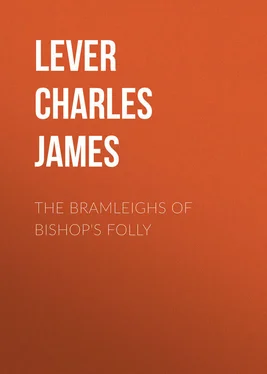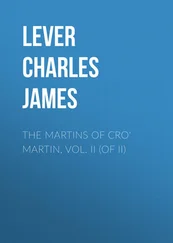Charles Lever - The Bramleighs of Bishop's Folly
Здесь есть возможность читать онлайн «Charles Lever - The Bramleighs of Bishop's Folly» — ознакомительный отрывок электронной книги совершенно бесплатно, а после прочтения отрывка купить полную версию. В некоторых случаях можно слушать аудио, скачать через торрент в формате fb2 и присутствует краткое содержание. Издательство: Иностранный паблик, Жанр: literature_19, foreign_antique, foreign_prose, на английском языке. Описание произведения, (предисловие) а так же отзывы посетителей доступны на портале библиотеки ЛибКат.
- Название:The Bramleighs of Bishop's Folly
- Автор:
- Издательство:Иностранный паблик
- Жанр:
- Год:неизвестен
- ISBN:нет данных
- Рейтинг книги:4 / 5. Голосов: 1
-
Избранное:Добавить в избранное
- Отзывы:
-
Ваша оценка:
- 80
- 1
- 2
- 3
- 4
- 5
The Bramleighs of Bishop's Folly: краткое содержание, описание и аннотация
Предлагаем к чтению аннотацию, описание, краткое содержание или предисловие (зависит от того, что написал сам автор книги «The Bramleighs of Bishop's Folly»). Если вы не нашли необходимую информацию о книге — напишите в комментариях, мы постараемся отыскать её.
The Bramleighs of Bishop's Folly — читать онлайн ознакомительный отрывок
Ниже представлен текст книги, разбитый по страницам. Система сохранения места последней прочитанной страницы, позволяет с удобством читать онлайн бесплатно книгу «The Bramleighs of Bishop's Folly», без необходимости каждый раз заново искать на чём Вы остановились. Поставьте закладку, и сможете в любой момент перейти на страницу, на которой закончили чтение.
Интервал:
Закладка:
The vulgar impertinence of Cutbill made indeed but little impression upon him. An annoyance while it lasted, it still left nothing for memory that could not be dismissed with ease. It was Marion. It was what she had said that weighed so painfully on his heart, wounding where he was most intensely and delicately sensitive. She had told him – what had she told him? He tried to recall her exact words, but he could not. They were in reply to remarks of his own, and owed all their significance to the context. One thing she certainly had said – that there were certain steps in life about which the world held but one opinion, and the allusion was to men marrying late in life; and then she added a remark as to the want of “sympathy” – or was it “harmony” she called it? – between them. How strange that he could not remember more exactly all that passed, he, who, after his interviews with Ministers and great men, could go home and send off in an official despatch the whole dialogue of the audience. But why seek for the precise expressions she employed? The meaning should surely be enough for him, and that was – there was no denying it – that the disparity of their ages was a bar to his pretensions. “Had our ranks in life been alike, there might have been force in her observation; but she forgets that a coronet encircles a brow like a wreath of youth;” and he adjusted the curls of his wig as he spoke, and smiled at himself more successfully than he had done before.
“On the whole, perhaps it is better,” said he, as he arose and walked the room. “A mésalliance can only be justified by great beauty or great wealth. One must do a consumedly rash thing, or a wonderfully sharp one, to come out well with the world. Forty thousand, and a good-looking girl – she is n’t more – would not satisfy the just expectations of society, which, with men like myself, are severely exacting.”
He had met with a repulse, he could not deny it, and the sense of pain it inflicted galled him to the quick. To be sure, the thing occurred in a remote, out-of-the-way spot, where there were no people to discover or retail the story. It was not as if it chanced in some cognate land of society where such incidents get immediate currency and form the gossip of every coterie. Who was ever to hear of what passed in an Irish country-house? Marion herself indeed might write it – she most probably would – but to whom?
To some friend as little in the world as herself, and none knew better than Lord Culduff of how few people the “world” was composed. It was a defeat, but a defeat that need never be gazetted. And, after all, are not the worst things in all our reverses, the comments that are passed upon them? Are not the censures of our enemies and the condolences of our friends sometimes harder to bear than the misfortunes that have evoked them?
What Marion’s manner towards him might be in future, was also a painful reflection. It would naturally be a triumphant incident in her life to have rejected such an offer. Would she be eager to parade this fact before the world? Would she try to let people know that she had refused him? This was possible. He felt that such a slight would tarnish the whole glory of his life, whose boast was to have done many things that were actually wicked, but not one that was merely weak.
The imminent matter was to get out of his present situation without defeat. To quit the field, but not as a beaten army; and revolving how this was to be done he sunk off to sleep.
CHAPTER XVII. AT CASTELLO
A private letter from a friend had told Jack Bramleigh that his father’s opposition to the Government had considerably damaged his chance of being employed, but that he possibly might get a small command on the African station. With what joy then did he receive the “official,” marked on H.M.‘s service, informing him that he was appointed to the “Sneezer” despatch gunboat, to serve in the Mediterranean, and enjoining him to repair to town without unnecessary delay, to receive further orders.
He had forborne, as we have seen, to tell Julia his former tidings. They were not indeed of a nature to rejoice over, but here was great news. He only wanted two more years to be qualified for his “Post,” and once a captain, he would have a position which might warrant his asking Julia to be his wife, and thus was it that the great dream of his whole existence was interwoven into his career, and his advancement as a sailor linked with his hopes as a lover; and surely it is well for us that ambitions in life appeal to us in other and humbler ways than by the sense of triumph, and that there are better rewards for success than either the favor of princes or the insignia of rank.
To poor Jack, looking beyond that two years, it was not a three-decker, nor even frigate, it was the paradise of a cottage overgrown with sweetbrier and honeysuckle, that presented itself, – and a certain graceful figure, gauzy and floating, sitting in the porch, while he lay at her feet, lulled by the drowsy ripple of the little trout-stream that ran close by. So possessed was he by this vision, so entirely and wholly did it engross him, that it was with difficulty he gave coherent replies to the questions poured in upon him at the breakfast-table, as to the sort of service he was about to be engaged in, and whether it was as good or a better thing than he had been expecting.
“I wish you joy, Jack,” said Augustus. “You’re a lucky dog to get afloat again so soon. You have n’t been full six months on half-pay.”
“I wish you joy, too,” said Temple, “and am thankful to Fate it is you, and not I, have to take the command of H.M.‘s gunboat ‘Sneezer.’”
“Perhaps, all things considered, it is as well as it is,” said Jack, dryly.
“It is a position of some importance. I mean it is not the mere command of a small vessel,” said Marion, haughtily; for she was always eager that every incident that befell the family should redound to their distinction, and subserve their onward march to greatness.
“Oh, Jack,” whispered Nelly, “let us walk over to the cottage, and tell them the news;” and Jack blushed as he squeezed her hand in gratitude for the speech.
“I almost wonder they gave you this, Jack,” said his father, “seeing how active a part I took against them; but I suppose there is some truth in the saying that Ministers would rather soothe enemies than succor friends.”
“Don’t you suspect, papa, that Lord Culduff may have had some share in this event? His influence, I know, is very great with his party,” said Marion.
“I hope and trust not,” burst out Jack; “rather than owe my promotion to that bewigged old dandy, I ‘d go and keep a lighthouse.”
“A most illiberal speech,” said Temple. “I was about to employ a stronger word, but still not stronger than my sense of its necessity.”
“Remember, Temple,” replied Jack, “I have no possible objection to his being your patron. I only protest that he shan’t be mine . He may make you something ordinary or extraordinary to-morrow, and I ‘ll never quarrel about it.”
“I am grateful for the concession,” said the other, bowing.
“If it was Lord Culduff that got you this step,” said Colonel Bramleigh, “I must say nothing could be more delicate than his conduct; he never so much as hinted to me that he had taken trouble in the matter.”
“He is such a gentleman!” said Marion, with a very enthusiastic emphasis on the word.
“Well, perhaps it’s a very ignoble confession,” said Nelly; “but I frankly own I ‘d rather Jack owed his good fortune to his good fame than to all the peers in the calendar.”
“What pains Ellen takes,” said Marion, “to show that her ideas of life and the world are not those of the rest of us.”
Читать дальшеИнтервал:
Закладка:
Похожие книги на «The Bramleighs of Bishop's Folly»
Представляем Вашему вниманию похожие книги на «The Bramleighs of Bishop's Folly» списком для выбора. Мы отобрали схожую по названию и смыслу литературу в надежде предоставить читателям больше вариантов отыскать новые, интересные, ещё непрочитанные произведения.
Обсуждение, отзывы о книге «The Bramleighs of Bishop's Folly» и просто собственные мнения читателей. Оставьте ваши комментарии, напишите, что Вы думаете о произведении, его смысле или главных героях. Укажите что конкретно понравилось, а что нет, и почему Вы так считаете.












